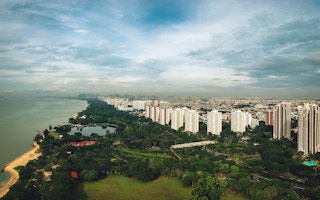Singapore is a developing country and stands as potential claimant to an international fund that is to help disadvantaged nations cope with climate risks, the country’s sustainability and environment minister Grace Fu said on Friday (24 February).
To continue reading, subscribe to Eco‑Business.
There's something for everyone. We offer a range of subscription plans.
- Access our stories and receive our Insights Weekly newsletter with the free EB Member plan.
- Unlock unlimited access to our content and archive with EB Circle.
- Publish your content with EB Premium.
The city-state is disproportionately affected by sea-level rise, and has an urgent need to channel money towards climate adaptation, Fu said.
“We emit 0.1 per cent of the carbon emissions [globally], but are affected by 100 per cent of the impacts of climate change,” she said.
She was responding to a question in Parliament from an opposition Workers’ Party member, who had pressed her on Singapore’s commitments and plans to the loss and damage fund. She reiterated in her responses that Singapore would engage with a transitional committee set up at the United Nations to kick-start planning for the fund.
She said that Singapore had not “even had a chance to discuss this internationally”, before deciding on whether to contribute or claim from the fund.
Countries globally had agreed to set up a landmark “loss and damage” fund at last November’s COP27 climate conference in Egypt — the fruition of many years of lobbying by developing countries to get financial help from richer states, which have spewed more carbon emissions historically, to recover from climate risks.
Details for the fund are sparse and are expected to be hashed out this year. Countries only agreed at COP27 that the fund is for “developing countries that are particularly vulnerable” to climate risks, a group not well-defined in global negotiating lexicon.
“Singapore belongs to [the group of] developing countries and we stand as potential claimants from this [loss and damage] fund,” Fu said.
Singapore, one of the richest states in the world when ranked by wealth per capita, falls in a category of less wealthy “developing” countries under international conventions, which had been set in the 1990s and largely been unchanged in climate fora. The city-state’s economy largely grew in earnest only after the 1960s, compared to the 1800s for some equally wealthy Western nations.
Fu said the guiding principle behind the loss and damage fund is that countries that are most responsible for climate change – referring to those which have long industrialised – lead in supporting vulnerable communities. Countries like Germany and New Zealand have already pledged to provide such funds.
There is currently “no linkage” between the loss and damage fund and companies in Singapore, Fu said, responding to a remark by a fellow People’s Action Party member that Singapore firms be consulted on the country’s plans on the fund. The current agreement internationally is that the money is to come from a “wide variety of sources”, suggesting that donor countries want multilateral banks and the private sector involved.
Fu added that Singapore is already diverting a lot of financial resources away from “other urgent needs” by adapting to its own climate risks – an effort that the government in 2019 estimated would cost S$100 billion (US$74.20 billion) in the long run.
“So I think we should really look at what is needed for us to adapt [to climate change] and how we can prevent such loss and damage from climate change from impacting our own properties and own institutions,” she said.
Fu’s reply in parliament on Friday hews closely with Singapore’s negotiating position at COP27, where the city-state joined forces with global developing country bloc G77, which it is member of, to push for the loss and damage fund. Singapore is also part of the Alliance of Small Island States, whose member states face threats from climate risks like sea-level rise.
G77’s early proposal for the fund was criticised by the European Union for sticking to a 1992 classification of developing and developed countries, which placed presently rich countries like Singapore, Qatar and South Korea in the developing category. More proposals had followed which picked on the wording on who pays and who receives the fund, before the final document, which observers said was vague, was passed by consensus.
Fu had said during COP27 that Singapore was seeking the “most cost-effective way” to make a climate impact, and doling out grants on the world stage may not ensure the best outcomes. She said Singapore would negotiate on the loss and damage fund with the “right spirit of cooperation and collaboration”.










